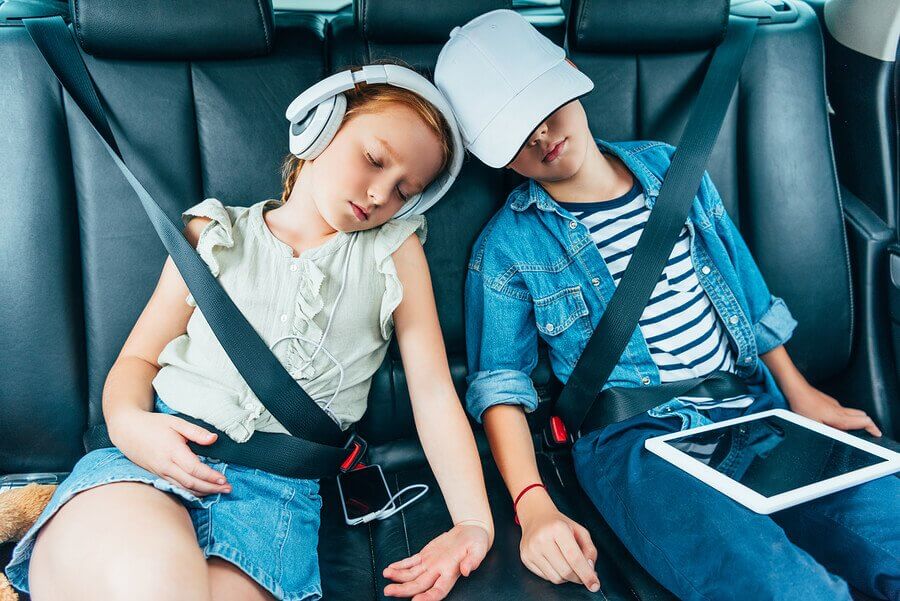Tips to Help Your Children Sleep Well on Vacation

Going on a trip when you have young children often represents a huge challenge. It’s good to know a few tips to help children sleep well on vacation.
First of all, when you travel, you must keep in mind that the environment will change and that you’ll probably be doing many different activities. However, it’s necessary to try to go about vacation without affecting children’s routines too much, including their naps.
Naps are important to consider, as children don’t perceive in their minds the change from one environment to another the same way as adults do. Observing new objects and locations can overexcite them and make them unable to fall asleep.
Tips to help children sleep well on vacation
It’s clear that during the holidays, our sleep routines become more flexible. But this isn’t to say that we can ignore our children’s resting needs.
Children’s bodies and minds need proper rest so that they can play, learn, and enjoy what they’ll see in the new environment, be it the beach, the mountain or recreational places.
So, to win the battle and help children get the rest they need while traveling, discover these effective tips to help them sleep better on vacation.

1. Take your children’s pillow, blanket, or stuffed animal on your trip
The most important advice for when you’re packing before leaving is to bring along part of your children’s bedding. Include their pillow, blanket, or stuffed animal that they usually sleep with. You can choose from one of these pieces, or if possible, include all three.
This action will produce a sense of familiarity in their brain. Even when they see them, touch them, and smell them, they’ll understand that bedtime has arrived.
2. How to combat jet lag
If your travel destination is far away, jet lag is the next enemy of your children’s dream. Jet lag is known as an imbalance with our biological clock — which is responsible for marking our waking and sleeping hours — when we move by plane across different territories with different time zones.
For children to keep their sleep cycle stable during long plane trips, parents should be subtracting or adding an hour to sleeping and eating routines around a week before the trip. This way, your children’s bedtime schedule will be more similar to that of the country of destination.
When you reach the site, you should try to do an outdoor activity so that the children can observe the light or natural darkness of the city. This way, their little biological clock can be adjusted gradually to the day cycle of the country in which they’re located.
“Children don’t perceive in their minds the change from one environment to another in the same way as adults. This can cause them to have trouble falling asleep “
3. Keep the same sleep rules that you established at home
Children shouldn’t think that because there is a change of place, the sleep rules have already been discarded. Therefore, you must remain firm, but patient, so that the child can go to bed when it’s time.
This action is necessary because children tend to take three days to acquire a new sleep habit and only one day to lose it. It’s ideal to maintain your home sleep routine as much as possible.

This includes routines like nap time, a bath before going to bed, turning off the TV or light, or sleeping with the bedroom door open or closed.
As a final recommendation, whenever possible and convenient, don’t share the bed with your children if they sleep in a separate room at home. This can generate a new attachment and they won’t want to sleep alone again once you return home.
All cited sources were thoroughly reviewed by our team to ensure their quality, reliability, currency, and validity. The bibliography of this article was considered reliable and of academic or scientific accuracy.
- Mindell, Jodi A. et al. “A Nightly Bedtime Routine: Impact on Sleep in Young Children and Maternal Mood.” Sleep 32.5 (2009): 599–606. Sleep. Web. Mindell, J et al. “Bedtime Routines for Young Children: A Dose-Dependent Association with Sleep Outcomes.”
- Sleep
- 38.5 (2015): 717–722.
- Sleep
- . Web. Zisberg, Anna, Nurit Gur-Yaish, and Tamar Shochat. “Contribution of Routine to Sleep Quality in Community Elderly.”
- Sleep
- 33.4 (2010): 509–514.
- Sleep
- . Web.
- https://www.mendeley.com/catalogue/cognitive-behavioral-andfunctional-consequences-inadequate-sleep-inchildren-adolescents-1/